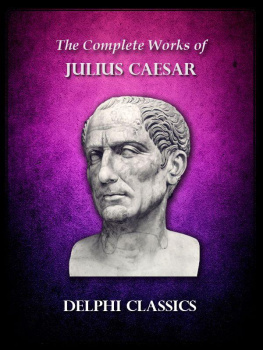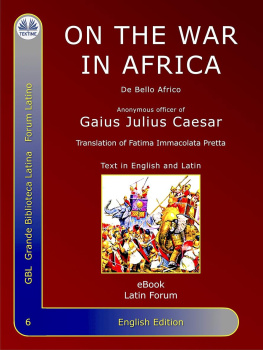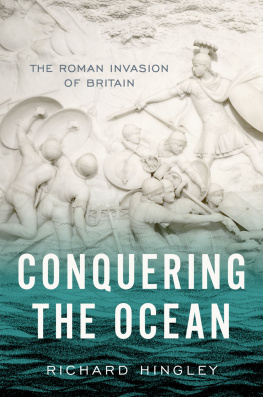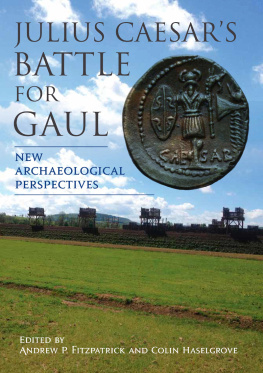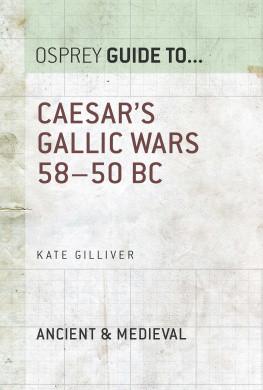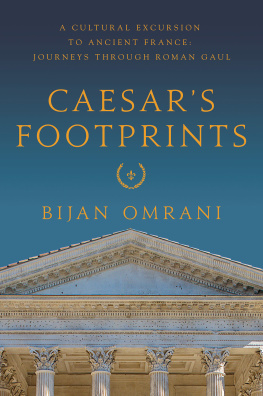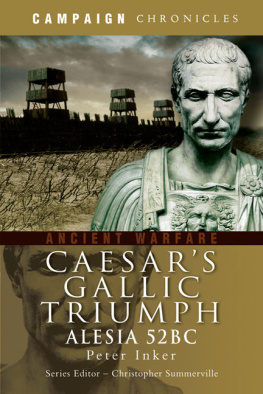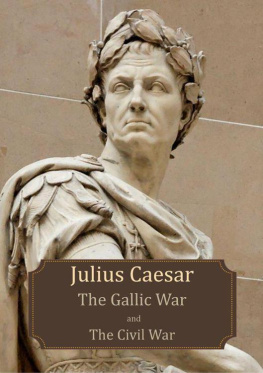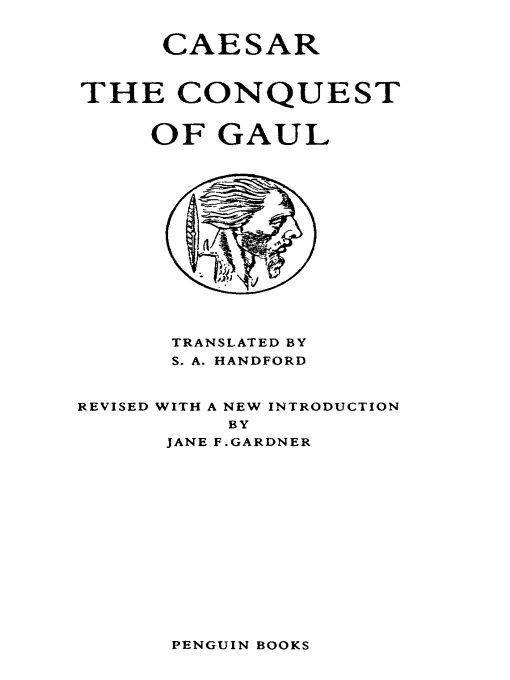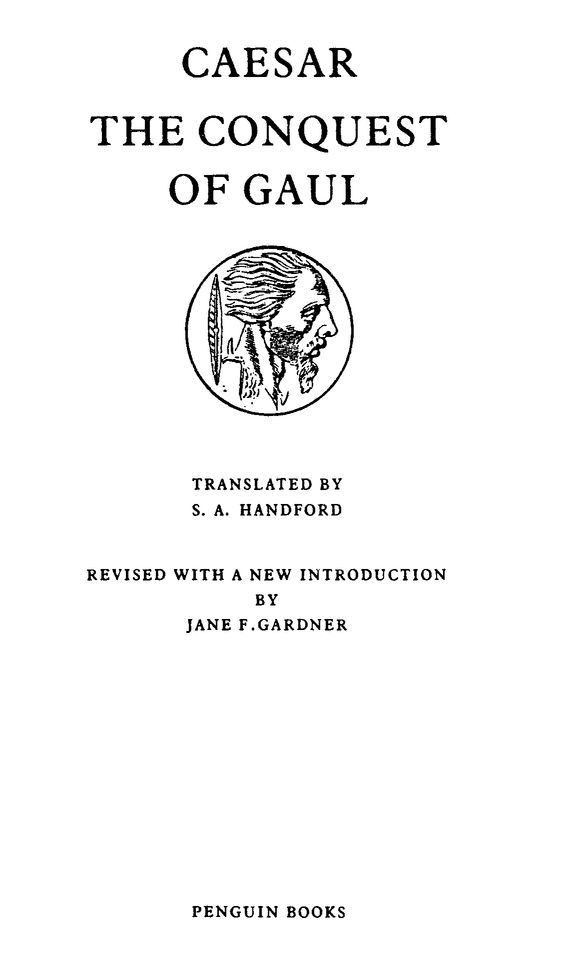Table of Contents
THE CONQUEST OF GAUL
ADVISORY EDITOR: BETTY RADICE
GAIUS JULIUS CAESAR was born in 100 B.C. into an ancient patrician family. He was an adolescent during the period of the proscription of Marius (his fathers brother-in-law), the dictatorship of Sulla and the early career of Pompey. His family were traditionally against the patrician senatorial oligarchy, and Caesar followed suit. He was imprisoned for a short time by Sulla, but managed to maintain good relations with the nobles for ten years after his release; his was even co-opted into the college of priests (73 B.C.). During the sixties, he advanced through the senatorial cursus to the rank of praetor, while supporting the popular side in politics. In 60 B.C. he formed with Pompey and Crassus the combination known to us as the first triumvirate, to overcome conservative senatorial opposition, and he was elected consul for 59 B.C. He was then created governor of Transalpine Gaul, a task which was to occupy him for nine years. He had left the two triumvirs to safeguard his interests in Rome but had to meet them at Ravenna and Lucca in 56 B.C. to renew their agreement. Pompey was appointed sole consul in 52 B.C. after the death of Crassus, which resulted in civil war and the defeat of the Pompeian faction in Spain (45 B.C.). Caesar came back to Rome as dictator. He tried to improve conditions for the roman citizen and increase the honesty and efficiency of the government. His dictatorship was declared perpetual in February 44 B.C., but his many bitter enemies hatched a conspiracy and assassinated him in March 44 B.C.
s. A. HANDFORD was born at Manchester in 1898 and educated at Bradford Grammar School and at Balliol College, Oxford, where he took a double first in Classics. He was a Lecturer in Swansea, and Lecturer and Reader at Kings College, London. He published several books on classical subjects, and translated Caesar, Sallust and Aesop for the Penguin Classics. He died in October 1978.
JANE GARDNER was born in 1934, and has degrees in Classics from Glasgow and Oxford Universities. She is a Professor of Ancient History at the University of Reading. Her publications include Women in Roman Law and Society (1986), Being a Roman Citizen (1993), Family and Familia in Roman Law and Life (1998) and a translation of Caesars The Civil War for Penguin Classics.
INTRODUCTION
1 Roman politics in the late Republic
Gaius Julius Caesar spent nine years - almost a sixth of his entire life and more than a third of his life as a member of the Senate - away from Rome, campaigning in Gaul. Half-way through, the military command he held was extended for a further five-year period. Political necessity, rather than military or than his personal irreplaceability in command, required that he continue in post. His victories had already been awarded public thanksgivings of unprecedented length in Rome; nevertheless, to resume private status would have meant political suicide - at the least, exile.
Politics at Rome was personal and factional, its significant operation confined within the membership of the Senate. Constitutionally, Rome was a Republic, with the legislative and electoral sovereignty vested in popular assemblies. In practice, control of government was in the hands of the Senate, itself made up of past and present holders of public office, and the effective policy-making body, although technically it was merely advisory to the magistrates. Before the birth of Caesar, there had been two major developments which had fundamentally changed the character of Roman politics. The Gracchi had shown that the sovereign power of the people could be used to break the Senates de facto control of government. However, they had no armed power with which to defend themselves against the senators reaction. Marius military innovations produced an army for whom soldiering was a means of earning a livelihood and - in the absence of a service gratuities commission - its commander the person to whom the soldiers looked to secure some provision for them on demobilization. Both became factors in the internal power struggles in the Senate. The tribunate was used as a means of proposing or blocking legislation whose popular provisions often were - or could be alleged to be - a mere bait for the electorate and a cover for ulterior personal power-seeking. The acquisition of a military command brought with it the opportunity to gain wealth, patronage, electoral support and armed power. Sulla, who himself seized power by force of arms after a civil war, attempted to forestall any repetition of such events by a programme of legislation which regulated the cursus honorum the sequence of magisterial offices - expanded the judicial system and put it under exclusive senatorial control, and imposed restrictions on the powers of the tribunes. Within less than a decade, virtually his entire construction had been either dismantled or ignored.
One of the prime agents in this was Pompey, whose own consulship in 70 B.C. flouted Sullan regulations - he was below the legal minimum age and had held none of the qualifying offices. A few years later, he gained in rapid succession, through tribunician legislation, two military commands - that against the pirates in 67, followed the next year by a command in Asia Minor for the pursuit of the war against Mithridates.
Meanwhile, his former consular colleague and rival, Crassus, made various attempts to strengthen his own position at Rome and there are good grounds for believing that Caesar was one of the rising politicians to whom he lent support. By family connection (he was a nephew by marriage of Marius), as well it would seem as by personal bent, Caesar favoured the popular line in politics. He had backed Pompeys rescinding of Sullan measures and supported the proposal to give him the Asiatic command. Cicero hints very strongly that he and Crassus were intended to be the chief beneficiaries of an agrarian commission which, if set up, would have created a group of officials holding military commands and with vast powers of patronage through the acquisition and distribution of land. His name was also linked with the failed popularis Catiline, whom Cicero has deluded subsequent generations into regarding as little better than a psychopath.
By 62 B.C., however, Caesar had had little success in his political ventures, though his career had advanced as far as the praetorship. As well as the matters already mentioned, he had in the mid sixties sponsored a series of abortive prosecutions against persons involved in the violence associated with the overthrow of Saturninus and with the Sullan proscriptions. His aim is uncertain but may have been to try to alert the Romans to the danger of leaving unresolved the question of the permissibility of the procedures by which, since the Gracchi, summary force had on several occasions been used by the State to deal with political opposition.
In 62 B.C. Pompey returned from the East and to general surprise disbanded his armies and returned to private life. With his troops, however, he found that he also gave up his influence with the Senate. Delays and excuses were interposed to the ratification of his Eastern settlement and the provision of land grants for his veterans. Cicero had hoped that political strife at Rome might be terminated by securing cooperation and recognition of common interest, a harmony of the orders, between the ruling elite, the Senate, and the non-senatorial wealthy class, the equestrian order (or knights), with Pompey as the leader and rallying-point acceptable to both.


